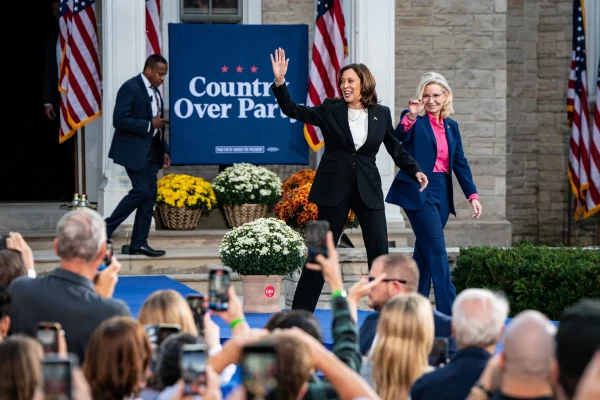Elections provide lots of information about the wants and needs of the American public. Since her loss, Kamala Harris’ campaign has been scrutinized under many lenses. Popular criticisms cite her lack of a distinct agenda, her plans for the government, or her three month campaign. However, these are all observations about what Harris did say. There’s
more to be found in what she didn’t voice: her identity.
According to an NYT article titled “The Way Harris Lost Will Be Her Legacy,” Tressie Cottom writes “Harris’s campaign positioned race and gender not as strengths to be reclaimed but flaws to be subsumed.” Other sources like the Times of India state that Harris did not
emphasize the historical nature of her

campaign because her supporters and colleagues did it for her. This omission is only amplified when one looks at Hillary Clinton’s 2016 campaign, where gender was crucial in Clinton’s framing of the “highest and hardest glass ceiling.”
The Harris campaign made a clear choice that points to several things. The first is that it was an assumption that voters would find Harris’ track record and messages for the future more appealing than her background. The second is a sense that voters would not respond well to campaigning on identity, or that identity politics would have had a negative effect. The latter isn’t too far of a stretch, seeing as there are many who believe, according to the New Statesman, that Harris was chosen for nominee “not on her individual electoral appeal but on the basis of her sex and race.” Perhaps there was some value in not pushing the identity too far. However, as Cottom writes in her opinion piece, “If you have to hide the light of your race and gender […] to [be] the first Black female president, then identity still matters very much indeed.”
There has been a general shift from identity politics since the last election. “Back then,” the NYT article titled “In Shift from 2020 Identity Politics Loses Its grip on the Country” states, “as the progressive movement tried to establish itself as a bulwark to the Trump White House, considerations of race, gender and sexual orientation became urgent and unavoidable.” The upholding of a strict set of language and expectations became the norm for a period quickly became divisive. The Politico article titled “Democrats Wonder: Are We Too Correct?” notes the pitfalls of identity politics and notable figures in the party that advise against “appeals to group, not individual, identities,”

This sentiment away from group identities has shown up in Harris’ campaigning through her rallies with former Republican Representative Liz Cheney and groups like Republicans for Harris, as well as Harris’ statements about being a gun owner and her need to “earn everyone’s vote” as opposed to banking on dedicated voters.
Identity politics started out as a tool to understand others. In Cottom’s article, she writes that todays’ view of identity politics is “rooted in the shared group identity based on linked oppressions. That link to oppression is key. It is why only minorities are thought to have an “identity” in identity politics.” In other words, racial and gendered identities are only considered in nonwhite and nonmale populations. If the thought of identity politics was expanded to everyone, it would be a useful tool to understand how voters view candidates and issues, not a basis for drawing lines.
Harris’ campaign has illustrated clearly the growing shift away from group identities, but it is important to remember that the Trump campaign was one that revolved around identities even more — “Trump wrote the second volume of his story of which identities should matter most,” writes Cottom. Even so, with Trump votes increasing across both gender and race, that may not be how the electorate sees it. The decline in using identity politics as a divisive tool signals a shift away from treating groups as a monolith and towards an understanding of the individual.


